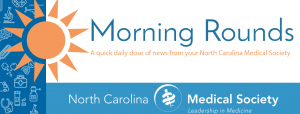T.G.I.F! Enjoy your NCMS Morning Rounds.
August 20, 2021
Pleae don’t forget to complete this month’s NCMS Town Hall survey by 5 p.m. today.
This quick, 3-question survey helps us better understand the current issues you and your patients face and how we can be most effective as your professional society.
Third COVID-19 Vaccine Available
On August 12, 2021, the FDA modified the Emergency Use Authorizations (EUAs) for Pfizer-BioNTech COVID-19 vaccine and Moderna COVID-19 vaccine to allow for administration of an additional dose (e.g., a third dose) of an mRNA COVID-19 vaccine after an initial two-dose primary mRNA COVID-19 vaccine series for certain immunocompromised people (e.g., people who have undergone solid organ transplantation or have been diagnosed with conditions that are considered to have an equivalent level of immunocompromise). The age groups authorized to receive the additional dose are unchanged from those authorized to receive the primary vaccination series:
- Pfizer-BioNTech: ages ≥12 years
- Moderna: ages ≥18 years
Read full SPECIAL BULLETIN COVID-19 #176 here.
Emergency Rural Health Care Grants
American Rescue Plan Act
The Emergency Rural Health Care program is designed to help broaden access to COVID-19 testing and vaccines, rural health care services, and food assistance through food banks and food distribution facilities.
Rural health care is challenged by immediate financial needs stemming from COVID-19 related expenses. Long-term access to – and availability of – rural health care services have been further hampered as a result of the COVID-19 pandemic. In response to these challenges, this program offers two tracks of funding to eligible applicants.
- Track One: Recovery Grants provide immediate relief to address the economic conditions arising from the COVID-19 emergency
- Track Two: Impact Grants advance ideas and solutions to solve regional rural health care problems to support the long-term sustainability of rural health
Eligible applicants include public bodies, community-based nonprofits, and federally-recognized Tribes. Facilities and projects supported through this grant must be located in rural areas with populations of 20,000 or fewer, and must primarily serve rural areas.
Mountain Area Health Education Center CEO Announces Retirement
After nine and a half years leading the Mountain Area Health Education Center (MAHEC), Jeffery Heck, MD, has announced plans to retire as CEO of the Asheville-based academic health center and safety net provider. MAHEC is the largest nonprofit in Western North Carolina (WNC) and one of nine area health education centers dedicated to improving health across the state. MAHEC’s clinical practices support approximately 200,000 patient visits per year. As MAHEC’s president and CEO since 2012, Heck led the organization through a threefold expansion, increasing the nonprofit’s annual operating budget from $30 to $100 million and the number of employees from 300 to more than 900.
MAHEC’s board of directors remains committed to the organization’s mission and is actively searching for a chief executive who can guide the organization’s strategic growth, identify opportunities in the midst of challenges, and lead healthcare transformation at all levels.
Read the full press release here.
HAPPY RETIREMENT, Dr. Heck!
In the News
Why Monoclonal Antibodies Are The Delta Surge’s Unsung Hero, Becker’s Hospital Review, 8-17-21
Learning Opportunity
USDA Rural Development Emergency Rural Health Care Program Webinar | August 25, 2021, at 2:00pm EDT
The Emergency Rural Health Care program provides up to $500 million in grant funding to help broaden access to COVID-19 testing and vaccines, rural health care services, and food assistance through food banks and food distribution facilities. Funding is distributed to eligible applicants through two tracks:
- Track One: Recovery Grants provide immediate relief to address economic conditions arising from the COVID-19 emergency
- Track Two: Impact Grants advance ideas and solutions to solve regional rural health care problems to support the long-term sustainability of rural health
Register here.
Join this webinar to learn more about who can apply, how the funding can be used, and where to submit an application. For additional resources or questions, please view https://www.rd.usda.gov/erhc or email [email protected].
If you have policies you’d like your NCMS Board of Directors to consider, please complete the Board input form here. Thanks for reading!

